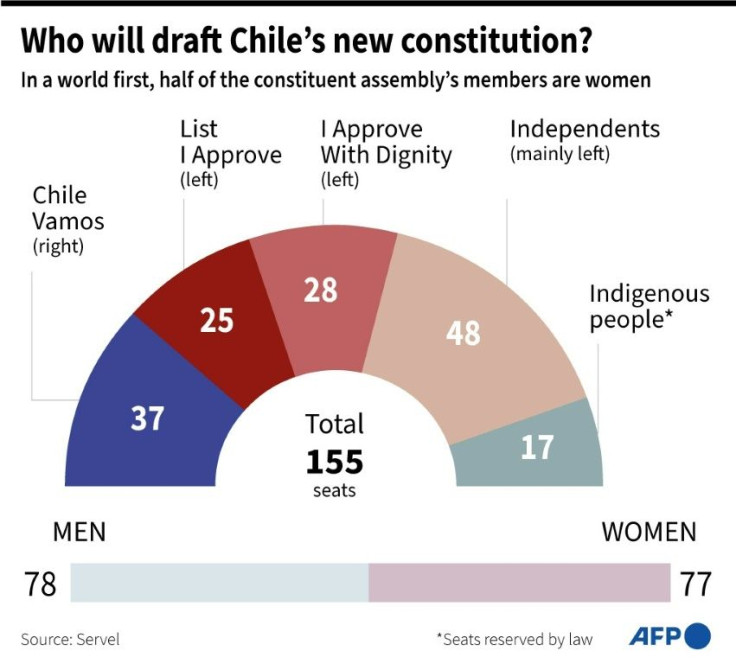Uncertain Outlook For Chile With Political Change Afoot
Chile, Latin America's richest country but deeply unequal, faces an uncertain economic future after mostly left-leaning independents swept elections to dominate a body that will rewrite the country's free market-friendly constitution.
Over the course of nine months, the 155-member drafting body will have to balance a popular clamor for profound social change with the need to maintain a robust economy that many attribute to Chile's conservative, dictatorship-era constitution.
Much to pundits' surprise, voters in weekend elections flocked to independent candidates with no party affiliation but overwhelmingly leftist or socialist ideas for the new constitution-writing "convention".
Rightwing parties, in power in Chile and backed by the business sector, were left with less than a quarter of seats.
This means the right will have no veto on the body that needs a two-thirds majority to approve the draft constitution it will put to a national referendum next year, in which voting will be mandatory.
The Santiago stock exchange did not like the election result, opening nearly 10 percent lower on Monday while the peso retreated 2.0 percent against the US dollar.
"The strong showing of independent candidates... implies scope for a significant shift in Chile's macroeconomic policy framework," said an analysis by the Institute of International Finance (IIF), an industry association.
Claiming 48 seats on the new "constitutional convention", most independents had campaigned on leftist promises such as removing water provision and pension funds from private hands.
Chile is Latin America's richest country, but its working class is heavily indebted due to reliance on private health care, pensions and education -- the quality of which depends on how much you spend.
Deep societal inequalities and demands for a wider social safety net were at the root of widespread protests that erupted in October 2019, costing dozens of lives and forcing the current rewrite of Chile's founding law.
Activists say the constitution, which dates from the rule of military dictator Augusto Pinochet, takes care only of the elite.
Turnout for the vote last Saturday and Sunday was low, at under 50 percent, but the result was a clear rebuke for traditional political parties and the right in particular.
Independent candidates form the biggest single bloc on the new convention, with leftist opposition parties making up most of the rest.
Seventeen seats were reserved for representatives of Chile's indigenous peoples.

"Several things are going to change, without any doubt, due to the composition (of the convention) and the absence of a veto for the right," Gonzalo Martner, an economist with the University of Santiago, told AFP.
The IIF agreed that change was inevitable, "given the depth of popular antipathy and the legacy of deep income inequality."
This will include, it said, "a more explicit and expanded role for historically underserved groups, which will likely increase spending needs."
Given the unusual and unexpected make-up of the drafting body, observers expect much horse-trading and bickering over the coming months.
"It is not a monolithic bloc," economist Valentin Carril said of the independent candidates, and predicted "difficulty" in finding consensus.
"That means a lot of uncertainty," he told the Diario Financiero newspaper.
"My baseline scenario is that there will be uncertainty until the constitutional convention is over."
This comes as there are already jitters after Chile's lower house of parliament this month approved a bill seeking to impose an extra tax on sales of copper and lithium.
Opposed by industry and the president of the world's largest copper producer, the bill now goes to the Senate.
The government recently also came under pressure to allow people to make early pension withdrawals as a buffer against pandemic fallout -- alleviating short-term pain but possibly threatening longer-term financial stability.
In the coming months, investors will be keeping an eye out for signs of increased public spending, nationalization of natural resources, and threats to macroeconomic stability.
But the results of last weekend's elections -- also for local councilors, mayors and governors -- made it clear that the ruling right finds itself in a precarious position ahead of general elections in November.
Among other major shifts, Santiago got its first-ever Communist Party mayor in Iraci Hassler, who beat Felipe Alessandri of President Sebastian Pinera's National Renewal party.
"Political events now underway stand to substantially increase country risk perception," said the IIF analysis.
"Political fragmentation and eroded faith in traditional political parties adds significant uncertainty."
© Copyright AFP 2024. All rights reserved.





















